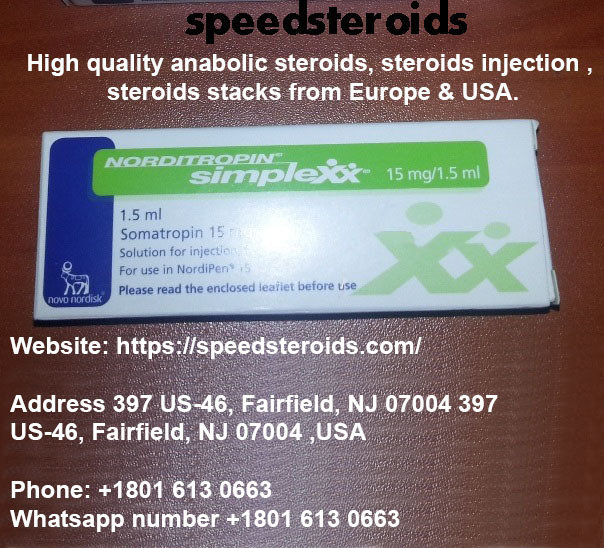NORDITROPIN SIMPLEXX 45IU 15MG CARTRIDGE*15mg/1.5ml
NORDITROPIN SIMPLEXX 45IU*15 mg in a 1.5 ml of solution in a cartridge (Type I glass) closed at the bottom with a rubber stopper (Type I rubber closures) shaped sort of a plunger and at the highest with a laminated rubber stopper (Type I rubber closures) shaped sort of a disc and sealed with an aluminum cap. The aluminum cap is sealed with a colored cap (green). Pack sizes of 1, 3, and 5. The cartridges are blister packed during a box.
As with other presentations of NORDITROPINE (NORDIFLEX and SIMPLEXX), NORDITROPINE NORDIFLEX 5 mg / 1.5 ml and 10 mg / 1.5 ml should be stored in a refrigerator (2 °C – 8 °C) within the package. Outside, faraway from light.
After first opening then in use, the product is also stored for up to 28 days within the refrigerator (2 °C – 8 °C), or up to 21 days at a temperature not exceeding 25 °C.
It is necessary:
Norditropin could be a polypeptide hormone of recombinant dna origin. The hormone is synthesized by a special strain of E. coli bacteria that has been modified by the addition of a plasmid that carries the gene for human growth hormone. Norditropin contains the identical sequence of USA amino acids constituting the present pituitary human growth hormone with a relative molecular mass of about 22,000 Daltons.
Therapy with Norditropin should be supervised by a physician who is experienced within the diagnosis and management of pediatric patients with short stature associated with GHD, Noonan syndrome, Turner syndrome or SGA, and adult patients with either childhood-onset or adult-onset GHD.
Dosage:
Growth hormone insufficiency
0.025-0.035 mg/kg/day or 0.7-1.0 mg/m2/day
When GHD persists after growth completion, growth hormone treatment should be continued to realize full somatic adult development including lean body mass and bone mineral accrual (for guidance on dosing, see Replacement therapy in adults).
§ Turner syndrome
§ 0.045-0.067 mg/kg/day or 1.3-2.0 mg/m2/day
§ Chronic renal disease
§ 0.050 mg/kg/day or 1.4 mg/m2/day (see section 4.4)
§ Small for gestational age
§ 0.035 mg/kg/day or 1.0 mg/m2/day

A dose of 0.035 mg/kg/day is typically recommended until the ultimate height is reached (see section 5.1).
Treatment should be discontinued after the primary year of treatment if the peak velocity SDS is below +1.
Treatment should be discontinued if height velocity is < 2 cm/year and, if confirmation is required, age is > 14 years (girls) or > 16 years (boys), like closure of the epiphyseal growth plates.
Adult population:
Replacement therapy in adults
The dosage must be adjusted to the necessity of the individual patient.
In patients with childhood-onset GHD, the recommended dose to restart is 0.2-0.5 mg/day with subsequent dose adjustment on the idea of IGF-I concentration determination.
In patients with adult-onset GHD, it's recommended to start out treatment with a coffee dose: 0.1-0.3 mg/day. it's recommended to extend the dosage gradually at monthly intervals supported the clinical response and also the patient’s experience of adverse events. Serum IGF-I are often used as guidance for dose titration. Women may require higher doses than men, with men showing an increasing IGF-I sensitivity over time. this suggests that there's a risk that women, especially those on oral estrogen replacement are under-treated while men are over-treated.
Dose requirements decline with age. Maintenance dosages vary considerably from person to person, but seldom exceed 1.0 mg per day.
Side effects:
In children, side effects are usually uncommon or rare.
In adults, edema of the extremities is extremely common (1 in 10). Less common side effects include headaches, joint pain or stiffness, muscle pain or tenderness, and paraesthesia. additionally, carpal tunnel syndrome, diabetes, pain at the injection sites, itching, or muscle stiffness is rare . On rare occasion’s rash may occur, sometimes in children.
Other symptoms (with unknown frequencies) include:
– Abnormal laboratory test results
– bone problems
– Ear problems especially in people with Turner’s syndrome
– Hypersensitivity reactions
– Increase within the size of hands and feet
– increased blood sugar
– Intracranial hypertension
– Leukaemia
– Metabolic problems
– Production of anti-Norditropin SimpleXx antibodies
– reduced glucose tolerance
– Thyroid problems
CONTACT US
Address: 397 US-46, Fairfield, NJ 07004 397 US-46, Fairfield, NJ 07004 ,USA
Email: admin@speedsteroids.com
Phone: +1801 613 0663
Whatsapp number: +1801 613 0663